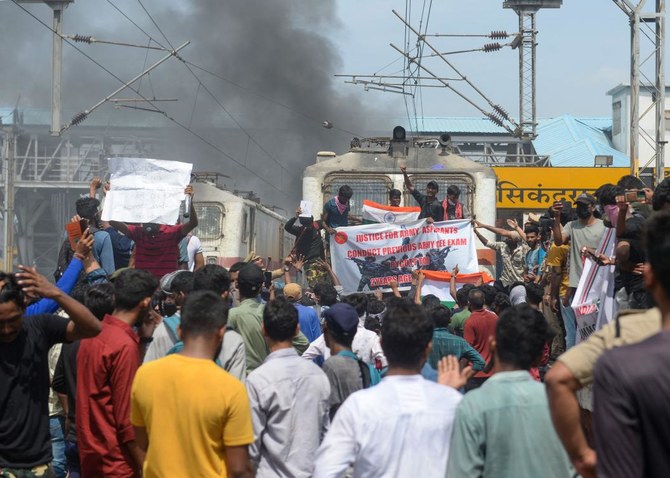One killed, several wounded in Afghan mosque bombing: police
At least one dead in protests over India’s military recruitment policy

- Police fired shots in the air on Thursday to push back stone-throwing crowds in the northern sate of Haryana
- Large-scale protests caused cancelation of 30 trains with another 29 trains diverted to safer routes
Updated 32 min 48 sec ago
AP
NEW DELHI: At least one person was killed on Friday as angry youths in parts of India burned train coaches, blocked highways and attacked police with rocks, in a second day of violent demonstrations against a new short-term government recruitment policy for the military, police officials said.
The death occurred in Secundrabad in southern India where nearly 500 protesters vastly outnumbered police as they rampaged the railroad station for more than an hour, police said. Another 15 people were reportedly injured.
Protesters attacked police with rocks and police used batons and fired shots to disperse them. One protester was killed in the police firing, a police officer said on condition of anonymity as he was not authorized to talk to reporters.
Television images showed people setting empty train coaches on fire and vandalizing property belonging to railroad authorities. They burned tires and blocked rail tracks, disrupting train services in the region for several hours. No injuries were immediately reported.
Under the new job program announced by Defense Minister Rajnath Singh this week, the armed forces this year can recruit 46,000 men and women in the age group 17.5-21 but only for four years. Seventy-five percent of them will be compulsorily retired after four years with no pension benefits.
A full-time recruited soldier serves for over 35 years.
The violence also hit eastern Bihar state where protesters set six train coaches on fire and damaged railroad stations, including offices and electronic installations. The protesters also blocked highways for hours, said S.K. Singhal, a police officer.
Protesters threw rocks at the homes of top governing Bharatiya Janata Party leaders Renu Devi and Sanay Jaiswal in Bettiah, a town in Bihar state, Singhal said. No one was injured.
The large-scale protests caused the cancelation of 30 trains with another 29 trains diverted to safer routes and 30 trains with passengers left stranded at different places in Bihar state, said Virendra Kumar, a railroad spokesman.
In northern Uttar Pradesh state, protesters threw rocks at buses in the city of Varanasi.
The government of Prime Minister Narendra Modi, which is facing national elections in 2024, is under pressure to provide jobs as India’s economy recovers from the pandemic slump. One idea behind short-term military recruitment is that those trained by the armed forces can later seek jobs with police or the private sector.
The government’s rationale also appears to save money by avoiding the pension burden by retiring them after four years. Pension pay-outs have averaged just under a quarter of India’s overall defense budget for years, leaving limited funds for the military’s modernization, said Rahul Bedi, a military analyst, in a blog post.
With 1.4 million active personnel, India’s military is the world’s second-largest after China, and the third-largest spender.
Army recruitment was halted for the past two years because of the COVID-19 pandemic, and thousands of aspirants spent the time preparing themselves to join the military.
“Now we are being told that we will have the job only for four years,’’ a protester said.
Defense Minister Singh late Thursday extended the age limit by two years as a one-time exception, noting there was no military recruitment for the past two years.
V.P. Malik, a retired Indian army chief, said the youths’ disappointment was understandable.
“The government and the armed forces have to do more work on their outreach to justify and explain the scheme to the youth,” he said in an interview with The Times of India newspaper.
